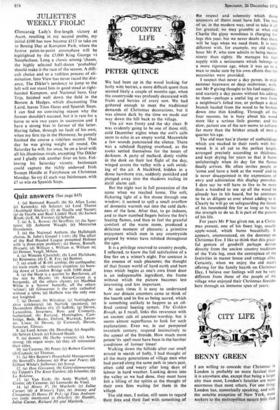COUNTRY LIFE PETER QUINCE
We had been up in the wood looking for holly with berries, a more difficult quest than seemed likely a couple of months ago, when the countryside was profusely decorated with fruits and berries of every sort. We had gathered enough to meet the traditional demands of Christmas decorations, but it was almost dark by the time we made our way down the hill back to the village.
The air was frosty and the sky clear. It • was evidently going to be one of those still, cold December nights when the owl's calls seem to echo in an empty world. Meanwhile a few sounds punctuated the -silence. There was a subdued flapping overhead, as the rooks settled themselves for the hours of darkness. A party of mallard, dimly visible in the dusk on their last flight of the day, winged across the valley with a soft swish- ing of the air. A blackbird, hidden in a dense hawthorn tree, suddenly panicked and plunged away into the shadows trailing its shrill alarm call.
But the night was in full possession of the scene when we reached home. The soft, flickering light of a fire shone through one window; it seemed to spill a small overflow of domestic warmth out into the cold dark4 ness of the lane. After that, to go indoors, and to thaw numbed fingers before the fire's leaping flames, and then to feel the grateful comfort of the warm room, produced a delicious moment of pleasure; a primitive enjoyment which men in any countryside gripped by winter have relished throughout the ages.
It is a privilege reserved to country people, I reflected, to know the full satisfaction of a fine fire on a winter's night. For contrast is the essence of such pleasures; the thought of that frozen world of hard earth and bare trees which begins at one's own front door is an indispensable ingredient, the frame without which the picture becomes less interesting and less important.
At such times it is easy to understand how our distant ancestors came to think of the hearth and its fire as being sacred, which is something unlikely to happen to an oil- fired central heating system. The Golden Bough, as I recall, links this reverence with an ancient cult of ancestor-worship, but it seems almost superfluous to look for such explanations. Even we, in our pampered twentieth century, respond instinctively to the appeal of the fireside. How much more potent-its spell must have been in the harsher conditions of former times!
Walking down the hillside after our small errand in search of holly, I had thought of all the many generations of village men who had pasted along the same path in years past, often cold and weary after long days of labour in hard weather. Looking down into the valley as we had done, they must have felt a lifting of the spirits at the thought of their own fires waiting for them in the village.
The old men, I notice, still seem to regard their fires and their fuel' with something of
the respect and solemnity which those ancestors of theirs must have felt. The rest of us, in the modern way, tend to take it all for granted; we may grumble at what old Charlie the gipsy woodman is charging for logs this year, but we never doubt that there will be logs when we need them. It is very different with, for example, my old neigh- bour Mr P, who now admits to- being nearer ninety than eighty. He manages his fuel supply with a seriousness which belongs 10 a more rigorous age, when it was up to a man to make sure by his own efforts that his necessities were provided.
I suspect that never a day passes, in mid- summer heatwave or deep midwinter, with. out Mr P giving thought to his fuel supplies: and scarcely a day passes without his adding to them—perhaps a useful log or two from a neighbour's felled tree, or perhaps a dead branch hauled from the wood to be broken down into thin kindling. Through all the four seasons, he is busy about his wood store like a serious little gnome; and his slow, patient use of the saw seems to achieve far more than the brisker attack of men a quarter his age.
The old'Inan has'a cluster of outbuildings which are stacked to their roofs with fire- wood. It is all cut to the perfect length, arranged precisely according to thickness, and kept drying for years so that it burns unfalteringly when its day for the flames finally arrives. He often invites people to 'come and have a look at the wood' and he is never disappointed in the expressions of envy and admiration. this display provokes. I dare say he will have to live to be more
than a hundred to use up all the wood he already has in his hoard, but he continues to be as diligent as ever about adding to it.
Clearly he will go on safeguarding the future of his household fire for as long as he has the strength to do so. It is part of the pattern of his life.
For years Mr P has given me, as a Christ. mas present, one of his finest logs, usually apple-wood, which burns beautifully. It appears, unannounced, on the doorstep on Christmas Eve. I like to think that this grace- ful gesture of goodwill perhaps derives directly from the ancient country traditions of the Yule log, once the centrepiece of the festivities in manor house and cottage alike.
Certainly, when we enjoy the old man's offering for the family hearth on Christmas
Day, I believe our feelings will not be very different from those of the people of the village who enjoyed their Christmas firesides here through an immense span of years.


















































 Previous page
Previous page